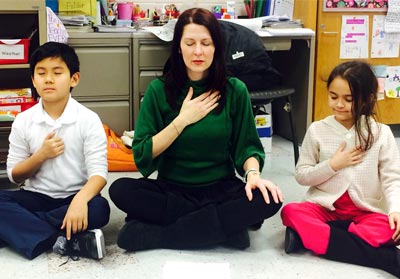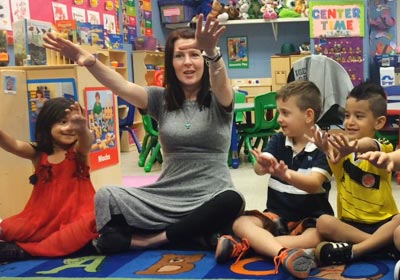
Mindfulness
“You can’t stop the waves, but you can learn to surf.”
— Jon Kabat-Zinn
EMOTIONAL SELF-REGULATION IS DIFFICULT FOR YOUNG CHILDREN. Today’s world is hectic and technologically driven, where constant multi-tasking has become the norm. This means that our children are constantly being bombarded by external stimulus which leaves them struggling with new emotions and challenging situations. Young children need help to learn strategies to support them in meeting and navigating these intense emotions. This is especially true for those in their critical years of early childhood development. Mindfulness activities help teach children these strategies. It’s been shown to improve children’s social skills, emotional well-being, as well as academic outcomes. In additional to this, it reduces feelings of stress, anxiety, depression or anger.
 At Bright Days, instead of attempting to control or eliminate perceived obstacles, we focus on strengthening positive human qualities. By doing this, children learn these critical techniques for meeting and navigating intense emotions. Mindfulness also cultivates positive states of mind like gratitude, kindness, joy and compassion. Additionally, it plays a role in effective communication and interaction, increasing social emotional skills.
At Bright Days, instead of attempting to control or eliminate perceived obstacles, we focus on strengthening positive human qualities. By doing this, children learn these critical techniques for meeting and navigating intense emotions. Mindfulness also cultivates positive states of mind like gratitude, kindness, joy and compassion. Additionally, it plays a role in effective communication and interaction, increasing social emotional skills.
In addition to daily mindfulness exercises with the children at our centre, mindfulness is incorporated and encouraged during all activities throughout the day. Our goal is to ensure that the benefits and skills learned by the children become second nature to them.
![]()
WHAT IS MINDFULNESS? Simply put, mindfulness means maintaining a moment-by-moment awareness of our thoughts, emotions, bodily sensations, and surrounding environment. It has numerous research-backed benefits including the following:

Image courtesy of Mindful Schools
- Better Focus and Concentration
- Increased Sense of Calm
- Decreased Stress and Anxiety
- Improved Impulse Control
- Increased Self Awareness
- Skillful Responses to Difficult/Intense Emotions
- Increased Empathy and Understanding of Others
- Development of Natural Conflict Resolution Skills
Mindfulness is a practice of developing equanimity. In a nutshell, this means the ability to let go of reactive behaviour. The children are then able to respond from a place of greater ease, stability, and wisdom, rather than compulsion.

HOW IS MINDFULNESS PRACTICED?
We have incorporated daily lessons and activities into our custom Bright Days Curriculum. The lessons offer a variety of techniques for achieving the benefits listed above, and have been adapted for the appropriate age groups. The practice of mindfulness includes direct attentional training. Students are guided in exercises that focus on various skills and techniques, such as:

Image courtesy of Mindful Schools
- Helping children label strong emotional states that they are feeling (“name it to tame it”), creating a greater level of emotional awareness.
- Working with the breath in various ways to promote grounding and centering. Kids love the fun, animal-themed breathing ‘games’!
- Orienting and “anchoring” to sound, sight and the external environment (an easy way to engage the parasympathetic nervous system when a child is getting stuck in sympathetic/stress arousal). Bringing immediate attention to any of the 5 senses, helps to ground children.
- Practicing heartfulness and developing positive emotional states including kindness, compassion, and gratitude. Watching and hearing the children send kind thoughts to their friends and family is one of the most rewarding parts of teaching mindfulness.
The idea behind these techniques is that there is an actual art and science involved in learning how to self-regulate and shift attention. More than anything, it is a practice. For the techniques to work in stress and conflict situations, they must be practiced when the child is more relaxed and at ease. They must also be practiced in manageable doses that are tailored to each specific age group, so that the children’s system becomes naturally accustomed to working with their attention and awareness over time.
![]()
IN THIS WAY THE TECHNIQUES ARE INTERNALIZED. The main goal and practice at Bright Days is to repeat short moments of practice with the children many times throughout the day.